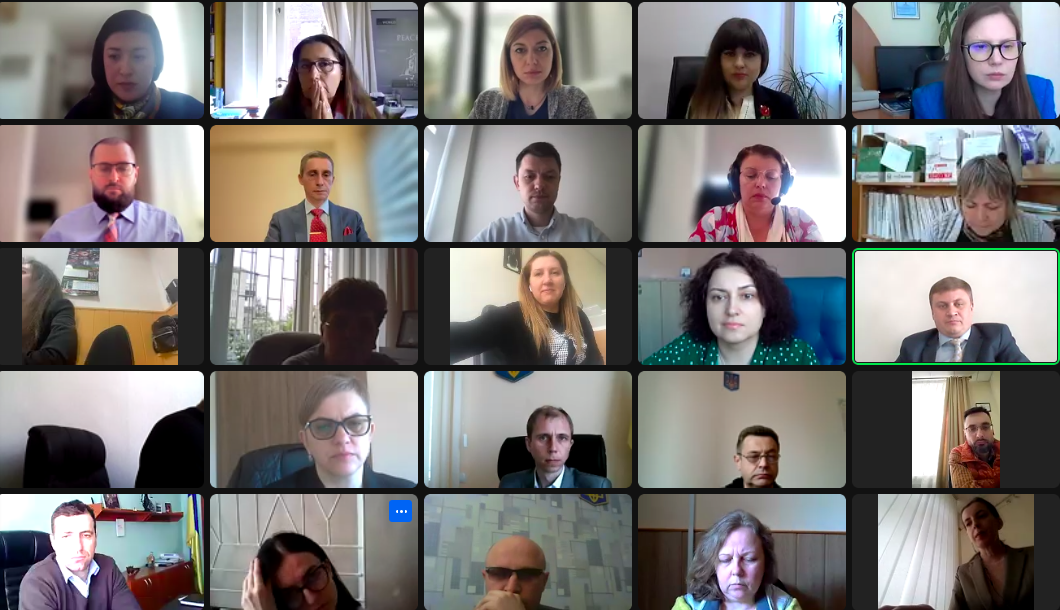Supporting Vulnerable Court Users and Victims of War Crimes: EU Project Pravo-Justice Contributed to Holding an International Online Conference

On April 25, the State Judicial Administration of Ukraine together with the International Association for Court Administration (IACA) organized an online conference “Creating a Support System for Vulnerable Court Users and Victims of War Crimes” with the support of EU Project Pravo-Justice, USAID Justice for All Program, and All-Ukrainian Association of Court Employees.
While opening the conference, Prof. Dr. Luis Maria Palma, President of the International Association for Court Administration (IACA), emphasized that it is important to take the proper approach to working with vulnerable court users and war crimes victims, both during pre-trial investigation and during trial.
“The International Association for Court Administration has joined the event to share experiences in creating a support system for vulnerable court users, war crimes witnesses and victims, volunteer services in court, arranging court premises and working with vulnerable court users and other important issues related to victim-centred justice,” said Prof. Dr. Luis Maria Palma.
Oleksii Salnikov, Head of the State Judicial Administration of Ukraine, noted that developing a system to support vulnerable court users, war crimes witnesses and victims in Ukraine is essential.
“Unfortunately, as the war continues in Ukraine, there are more and more vulnerable court users. Not only the number of war crimes victims and witnesses, but also the number of combatants and their family members has increased. All of them require special attention, information, advice and support to reduce psychological stress while they are in the courthouse. People need to feel that they are protected. Therefore, it is very important for the SJA to introduce initiatives for vulnerable court users in order to make Ukrainian courts more client-oriented,” said Oleksii Salnikov.
Volodymyr Chaban, Key National Expert on Judiciary, EU Project Pravo-Justice, noted that the efforts to support vulnerable court users, war crimes witnesses and victims in Ukraine are one of the key activities within the Model Courts Initiative.
“The judiciary in any country should take into account and respond to the needs arising from providing services to different groups of vulnerable court users. Treating victims and witnesses properly and providing them with adequate support is at the heart of the rule of law. Without victims and witnesses with internal trust in justice, it is difficult to ensure the proper functioning of the justice system. In this regard, it is important that courts have appropriate premises and provide specialized services to vulnerable court users,” emphasized Volodymyr Chaban.
Yevheniia Bondarenko, National Expert of EU Project Pravo-Justice, coordinator for working with vulnerable court users within the Model Courts Initiative, emphasized that it is important to have inter-institutional cooperation between justice sector institutions, higher education establishments, free legal aid centres and other stakeholders to ensure sustainable and effective services for vulnerable court users.
“Within the Model Courts Initiative, we have many success stories in creating services for vulnerable court users and volunteer services in courts due to high-quality inter-institutional cooperation. It is important to share them not only with Ukrainian partners but also with foreign ones. After all, it is peer experience that is often the best model to be implemented in other judicial institutions in Ukraine and abroad,” the expert emphasized.
Nataliia Korol, Chief of Staff of the Vinnytsia Court of Appeal, and Anna Mostetska, Judge-Speaker of the Ternopil City District Court of Ternopil Region, graduates of the inter-institutional training course “Training of Trainers on Implementing Services for Vulnerable Court Users” conducted within the framework of the Model Courts Initiative, presented the experience of creating volunteer services in courts.
Other examples of ensuring access to justice for vulnerable court users were presented by course alumni Oleksii Nesterenko, Judge Speaker of the Inhuletsk District Court of Kryvyi Rih, Dnipro Region, and Alina Kirakosian, Deputy Chief of Staff of the Court.
The peculiarities of working with war crimes witnesses and victims as a particularly sensitive group of trial participants were addressed in presentations by Evelyn Anoya, Professor at DePaul Law School, International Justice Consultant at TAG International, former Head of Judicial Services at the Special Tribunal for Lebanon, and Kateryna Shunevych, Head of the Analytical Centre of the Ukrainian Women Lawyers Association JurFem.
Moreover, Sonja Prostran, a representative of the International Association for Court Administration (IACA), covered best practices for equipping courtrooms to work with different categories of vulnerable persons.